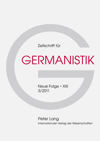
ZEITSCHRIFT FUR GERMANISTIK
Scope & Guideline
Advancing Scholarly Discourse in Germanic Studies
Introduction
Aims and Scopes
- Interdisciplinary Approaches to German Studies:
The journal promotes interdisciplinary research that merges literary analysis with insights from philosophy, history, and cultural studies, encouraging a multifaceted understanding of German literature. - Focus on Historical and Contemporary Literature:
It covers a wide range of literary works from the early modern period to contemporary literature, analyzing their historical contexts and cultural implications. - Critical Examination of Literary Theories:
The journal engages with various literary theories and methodologies, fostering critical discourse around narrative forms, poetics, and aesthetic practices. - Cultural and Societal Reflections:
Publications explore how literature reflects and engages with societal issues, cultural identities, and historical narratives, particularly in the context of German-speaking regions. - Promoting New Perspectives:
The journal encourages innovative research that challenges traditional narratives and offers fresh insights into established literary canons.
Trending and Emerging
- Digital Humanities and Literature:
There is a marked increase in publications exploring the intersection of digital technology and literary studies, including topics on digital archives, online literary communities, and the impact of digital media on narrative forms. - Post-Migrant Literature and Cultural Exchange:
Emerging themes focus on post-migrant literature and the dynamics of cultural exchange, reflecting Germany's diverse society and the complexities of identity in contemporary literature. - Environmental Literature and Ecocriticism:
The journal is seeing a rise in publications that address ecological themes and environmental concerns in literature, indicating a growing interest in how literature engages with ecological crises. - Narrative Theory and Unreliable Narration:
Recent issues have featured a surge in research addressing narrative theory, particularly the exploration of unreliable narration and its implications for understanding truth and perception in literature. - Intermediality and Cross-Genre Studies:
There is an increasing focus on intermediality, examining how literature interacts with other media forms such as film, music, and visual arts, thus broadening the scope of literary analysis.
Declining or Waning
- Traditional Narratives of the 18th Century:
While the journal has historically engaged with 18th-century literature, there has been a noticeable decline in publications focusing solely on traditional narratives from this period, suggesting a shift towards more contemporary themes. - Localized Studies of German Literature:
There appears to be a waning interest in regionally focused studies that do not connect to broader cultural or theoretical frameworks, as the journal increasingly emphasizes interdisciplinary and global perspectives. - Historical Literary Figures:
Research centered on individual historical literary figures has become less frequent, with a growing preference for thematic or genre-based studies that encompass multiple authors and works.
Similar Journals

COLLOQUIA GERMANICA
Connecting Scholars Through Insightful ResearchCOLLOQUIA GERMANICA, published by FRANCKE VERLAG, serves as a vital platform for the dissemination of scholarly research in the fields of linguistics, literature, and literary theory. With a rich history spanning from 2002 to 2017 and again from 2020 to 2024, this journal is indexed under ISSN 0010-1338 and is recognized within Q4 quartile rankings in both Linguistics and Language, and Literature and Literary Theory as of 2023. Although it operates primarily on a subscription basis, this journal endeavors to enhance academic discourse and promote innovative research that contributes to our understanding of Germanic languages and literature. Researchers and professionals can greatly benefit from the journal's content, given its position in Scopus with notable rankings and percentiles in various categories. COLLOQUIA GERMANICA invites submissions that offer fresh insights into the intricacies of language and literature, making it an essential read for academics and students alike.

FRENCH REVIEW
Navigating the Rich Tapestry of French Academic InquiryFRENCH REVIEW, published by Johns Hopkins University Press, is a premier journal in the fields of Cultural Studies, Education, Linguistics and Language, and Literature and Literary Theory. With its ISSN 0016-111X and E-ISSN 2329-7131, this journal serves as a vital resource for scholars and practitioners seeking to engage with contemporary topics through rigorous academic discourse. The journal has made notable strides in its impact factor, ranking in the third quartile for Cultural Studies and Linguistics, as well as the second quartile for Literature. While it currently does not offer open access, FRENCH REVIEW remains committed to fostering critical analysis and interdisciplinary approaches, effectively contributing to the advancement of research and understanding in its respective fields. With its converged years spanning from 2002 to 2024, this journal is an essential platform for exchanging ideas and enhancing knowledge in the vibrant landscape of French studies and beyond.

NEW GERMAN CRITIQUE
Exploring the Frontiers of German Studies and Cultural TheoryNEW GERMAN CRITIQUE is a prominent academic journal published by Duke University Press, focusing on the dynamic intersections of German studies, cultural theory, and social thought. With its ISSN 0094-033X and E-ISSN 1558-1462, this journal facilitates a critical dialogue within the Arts and Humanities and Cultural Studies fields. As a Q3-ranked journal in both categories as of 2023, it represents a significant platform for scholars exploring contemporary issues through a German lens, addressing themes of identity, memory, and cultural politics. Although NEW GERMAN CRITIQUE is not an open-access journal, it remains a crucial resource for researchers, professionals, and students interested in the evolving landscape of cultural studies, inviting contributions that foster innovative perspectives and facilitate intellectual exchange. Founded in 1988 and continuing its vital discourse into 2024, the journal is headquartered in Durham, North Carolina, and serves as a touchstone for those engaged in the complexities of modern German culture and its global implications.

MESTER
Elevating Voices in Cultural Studies and LinguisticsMESTER is a distinguished academic journal published by the UCLA College of Humanities, known for its commitment to advancing research in the fields of Cultural Studies, Linguistics and Language, and Literature and Literary Theory. With an ISSN of 0160-2764, this journal serves as a vital platform for scholars and professionals to disseminate innovative research and critical perspectives from diverse theoretical frameworks and cultural contexts. Although currently operating without an Open Access model, MESTER continues to uphold a rigorous peer-review process, ensuring that published articles maintain high academic standards. Recognized for its selective focus, MESTER holds a Q4 categorization in Cultural Studies and Linguistics, and Q3 in Literature and Literary Theory, situating it as a relevant, if emerging, voice within these disciplines. Housed within the significant repository of knowledge at UCLA, the journal beckons researchers, students, and practitioners to engage with its contributions to the humanities and build upon its foundations in cultural discourse.

DAPHNIS-ZEITSCHRIFT FUR MITTLERE DEUTSCHE LITERATUR
Exploring the Depths of Middle German LiteratureDAPHNIS-ZEITSCHRIFT FUR MITTLERE DEUTSCHE LITERATUR, published by EDITIONS RODOPI BV, is a distinguished journal dedicated to the exploration and critical analysis of Middle German literature, offering scholars a dedicated platform to contribute to the field. With an ISSN of 0300-693X and an E-ISSN of 1879-6583, the journal has established itself as a vital resource for researchers and students alike, fostering academic discourse and advancing scholarship in literature and literary theory. Operating from the Netherlands, DAPHNIS holds a notable position in the academic community, currently categorized in the Q3 quartile of literature and literary theory, ranked in the 59th percentile among its peers on Scopus. The journal’s commitment to promoting critical insights and comprehensive studies makes it an essential reference point for anyone engaged in the literary academic landscape. While it is not currently open access, access options are available through institutional subscriptions, ensuring that valuable research is disseminated widely. For contributors and readers, DAPHNIS is not just an academic journal; it is a collaborative space where scholarship meets creativity, enriching the understanding of the rich tapestry of Middle German literature.
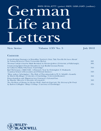
GERMAN LIFE AND LETTERS
Advancing Scholarly Discourse in German StudiesGERMAN LIFE AND LETTERS, published by WILEY, is a distinguished academic journal that has been a vital resource in the fields of Literature, Cultural Studies, and Sociology since its inception in 1936. With an impressive history spanning over eight decades, the journal is currently indexed with an E-ISSN of 1468-0483 and continues to serve as a critical platform for scholarly discourse and research across its converged years, encompassing materials from 1936 to 2024. Although classified in the Q4 and Q3 quartiles for various categories, its contributions significantly enrich our understanding of German literature and culture. Researchers, professionals, and students will find in this journal a captivating repository of insights, fostering a deeper appreciation for the interconnections between literature and socio-political themes. Unfortunately, it does not offer open access, but its wealth of knowledge and rigorous academic standards make it an essential read for those engaged in these disciplines.
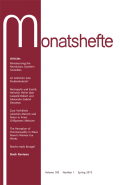
Monatshefte
Advancing Scholarly Discourse in German CultureMonatshefte is a prestigious academic journal published by the University of Wisconsin Press, dedicated to fostering scholarly discourse in the field of German Studies. With its ISSN 0026-9271 and E-ISSN 1934-2810, Monatshefte serves as a vital platform for researchers and students, offering peer-reviewed articles that delve into literature, culture, and linguistics. The journal plays an essential role in advancing knowledge and understanding of German intellectual traditions, making it indispensable for anyone interested in the dynamics of German culture. Although it is not an Open Access publication, its rigorous selection of high-quality research articles ensures its impact within the academic community. For researchers aiming to stay at the forefront of German Studies, Monatshefte provides a wealth of insights and critical analyses, fostering enhanced academic dialogue and innovation.
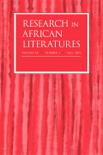
RESEARCH IN AFRICAN LITERATURES
Fostering Interdisciplinary Insights in African StudiesRESEARCH IN AFRICAN LITERATURES is a prestigious peer-reviewed journal published by Indiana University Press, dedicated to the critical exploration of African literary traditions, cultures, and texts. With an ISSN of 0034-5210 and an E-ISSN of 1527-2044, this journal stands out in the field of literature and literary theory, currently ranking in the 80th percentile of its category according to Scopus, making it a significant platform for scholars and researchers alike. Since its establishment, the journal has evolved through converged volumes from 2002 to 2024, consistently fostering innovative discourse and interdisciplinary approaches that illuminate the complexities of African narratives. Although it does not offer open access, the journal is integral for anyone engaged in African studies, providing critical insights that are essential for understanding the broader implications of literature within diverse cultural contexts. The journal's commitment to high standards of scholarship is reflected in its Q3 quartile ranking and its influential contribution to contemporary literary dialogue.
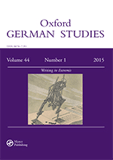
OXFORD GERMAN STUDIES
Navigating the Rich Landscape of German LinguisticsOXFORD GERMAN STUDIES, published by Routledge Journals, Taylor & Francis Ltd, is an esteemed academic journal dedicated to the exploration and scholarly examination of German literature and linguistics. With an ISSN of 0078-7191 and E-ISSN of 1745-9214, this journal has been in circulation since 1966, offering researchers a unique platform for critical discourse, innovative research, and interdisciplinary dialogue. It holds a significant position in the academic landscape, being categorized in the Q4 quartile for Linguistics and Language and Q3 for Literature and Literary Theory as of 2023. Despite lacking open-access options, the journal thrives in providing invaluable insights, aiming to bridge historical contexts with contemporary perspectives on German studies. It serves as an essential resource for scholars, professionals, and students eager to deepen their understanding of Germanic languages and literature. Located in Abingdon, United Kingdom, the journal continues to uphold its mission of advancing knowledge and fostering scholarly discussions in the rich field of German studies.
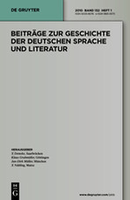
BEITRAGE ZUR GESCHICHTE DER DEUTSCHEN SPRACHE UND LITERATUR
Fostering Academic Excellence in the HumanitiesBEITRAGE ZUR GESCHICHTE DER DEUTSCHEN SPRACHE UND LITERATUR is a distinguished scholarly journal published by Walter de Gruyter GmbH, focusing on the historical development of the German language and literature. With an ISSN of 0005-8076 and an E-ISSN of 1865-9373, this journal has been a pivotal resource for linguistic and literary scholars since its inception in 1874. Hailing from Germany, it serves as a critical platform for understanding the nuanced evolution of Germanic studies, contributing to its categorization in the Q4 and Q3 quartiles in Linguistics and Language and Literature and Literary Theory, respectively, as of 2023. Although not open access, the journal provides invaluable peer-reviewed content that fosters scholarly dialogue and research in its specialized fields, making it an essential read for researchers, professionals, and students dedicated to the richness of German linguistic heritage and literary analysis. The journal's extensive history and commitment to academic excellence position it as a key player in the ongoing discourse within the humanities.